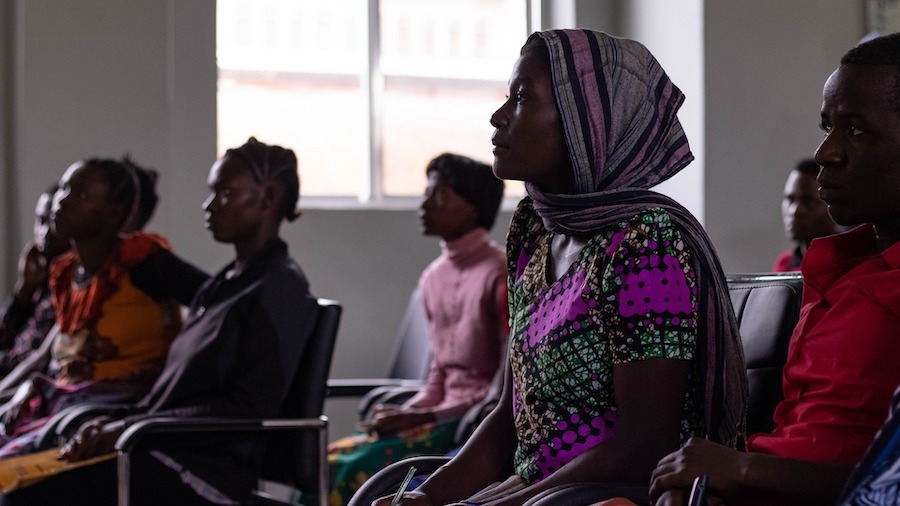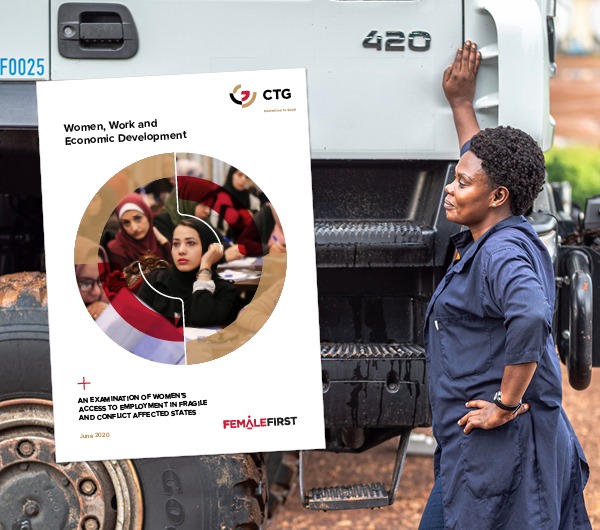Why Women’s Economic Empowerment is More Urgent Than Ever Before

Before the onset of today’s global pandemic, significant strides had been made towards achieving gender equality and women’s economic empowerment across the world over the past decades. Despite this, it had been predicted that it could still take over 170 years to close the gender gap. Then COVID-19 happened.
Where COVID-19 poses a much greater health risk to men, the longer-term implications have shown themselves to put women at a much greater disproportionate risk. These risks are linked to their social roles and will have a critical impact on the progress we have made towards Sustainable Development Goal (SDG) 5, on gender equality and women’s empowerment.
This disproportionate impact will be compounded for those women in fragile and conflict settings (FCAS), and will be particularly apparent in the world of work. Because of this, where improving women’s access to decent work in conflict settings and striving for gender equality in the workplace was important before, it is now urgent.
Women’s Economic Empowerment: The Impact of COVID-19
In a previous blog we shared the heavier economic impact that COVID-19 has on women than men. In April, the International Labour Organisation estimated that global working hours in the second quarter of 2020 will be 10.5 percent lower than pre-crisis level. This is the equivalent to the loss of 305 million full-time jobs. Since then, a further 195 million job losses have been forecasted.
Due to their lower income, reduced control over household resources and lack of access to financial services, women in fragile contexts have fewer financial safety nets to protect them during emergencies. In developing contexts it is often the woman’s income that keeps families above the poverty line, heightening their vulnerability during crises.
A Double Burden
In fragile contexts where governments are weak or too ineffective to provide security and decent services for its citizens, women often end up at the frontline of crises. For these women in FCAS, Covid-19 confronts them with a double burden.
Women in these settings are already affected by asymmetrical gender relations, being subordinated and excluded from many, if not all decision-making structures. Women and their needs are marginalised to the periphery of not just Covid-19 responses, but also those related to wider issues concerning politics and security.
This means the current crisis is an added threat to the already fragile protection of their wellbeing.
Women’s Contributions to Development
Despite efforts in mitigating the impact of Covid-19 in conflict-affected settings, the reduced levels of basic hygiene and access to healthcare, and the often high-density populations mean that the crisis will hit these populations harder than the developed world.
Effective crisis responses whether health related or conflict related, are rooted in community engagement and participation. This necessitates meaningful participation from all social groups. Local actors, especially women, can inform and improve development and humanitarian responses, for Covid-19 and beyond.
Improving women’s access to decent work, particularly within FCAS and in the humanitarian and development sectors, provides invaluable and multifaceted benefits.
Research has shown that women’s involvement in prevention and crisis responses leads to better outcomes and lowers risk. Women reveal problems that otherwise go undetected by men; and, specifically empowering women economically through decent work within conflict settings strengthens their resilience and that of their communities.
A Call to Action
Where the need for gender equality was important before, the onset of Covid-19 has made its urgency ever more apparent. The global pandemic has threatened crucial progress towards SDG 5 by deepening pre-existing inequalities. All of the SDGs are interrelated and interdependent, but SDG 5 in particular is prerequisite to see progress in all the other SDGs. Regression in SDG 5 threatens the entire 2030 Agenda for Sustainable Development.
While empowering women economically through decent work in FCAS is first and foremost a human right, it is also necessary to achieve a peaceful and prosperous world.
CTG is proposing a call to action to improve women’s access to decent employment in the countries that need their economic participation the most. Women must be mobilised into the centre of response efforts to all humanitarian and development projects – as participants driving the delivery of projects themselves and as beneficiaries whose needs are recognised as being equal to those of men. Not doing so represents a missed opportunity for greater economic and social development and therefore a missed opportunity for greater peace.
The current immediate focus on Covid-19 must not divert us from the equally important mission of women’s empowerment and gender equality. Not just for women but for everyone. As recent events have shown, women’s contributions to all areas of life are critical – in times of peace, fragility, and crisis.
Improving women’s access to decent employment in FCAS does not need to be hard. Read our white paper “Women, Work and Economic Development: An Examination of Women’s Access to Employment in Fragile and Conflict Affected States” for more information on the benefits, and the steps you can take to empower women in the workplace.





